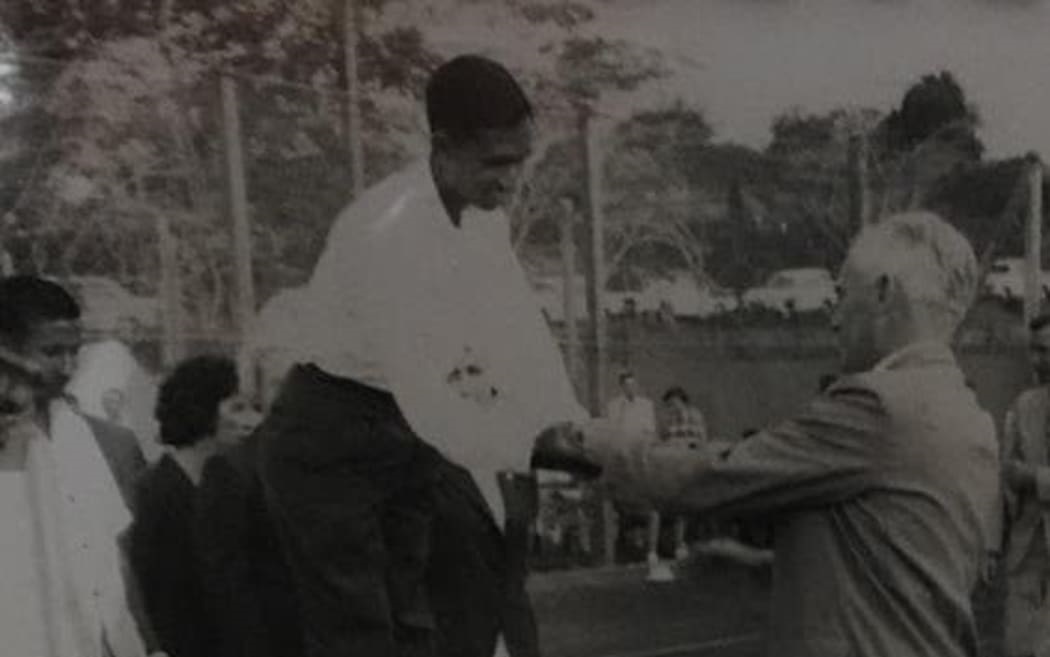A framed blazer worn by gold medal-winning lawn tennis player Rahim Zullah at the first South Pacific Games has been presented to the Fiji Association of Sports and National Olympic Committee (FASANOC).
The presentation was part of an recent event to mark the 60th anniversary of what is now called the Pacific Games.
The donated blazer was presented by Pacific Games Council president, Vidhya Lakhan, on August 29 to FASANOC president, Makarita Lenoa.
According to FASANOC’s website, Zullah wore the blazer in 1963.
Mr Lakhan spoke on the importance of the Pacific Games to the region’s athletes who may not get the chance to go to international events such as the Olympics and the Commonwealth Games.
At the presentation event, Mr Lakhan spoke briefly on the inception of the SPG through the visionary Dr Abdul Habib Sahu Khan of Lautoka, who proposed the concept during the 1959 South Pacific Conference held in Rabaul, Papua New Guinea.
Dr Sahu Khan had suggested that an interterritory sports tournament held every few years would overcome insularity in the Pacific.
The Rabaul conference unanimously accepted Dr Sahu Khan’s proposal and plans for the Suva Games were drawn up at a conference of islands sports officials in 1961.
“The idea gained momentum and was embraced by the South Pacific Commission,” FASANOC quoted Lakhan as saying.
“In a collaborative effort, nine territories convened in Noumea in March 1961, unanimously awarding Fiji the honor of hosting the first Games.”
Mr Lakhan said the owner of the 60-year-old blazer, Mr Zullah, won gold for Fiji against the then favourites Tahiti in the 1963 games.
“The Fiji Lawn Tennis team consisted of ten athletes including the recently departed Satyanand who was Fiji’s High Commissioner to New Zealand,” Mr Lakhan said.
“The blazer belonged to team mate Rahim Zullah who kept his blazer and now resides in Brisbane, Australia.”
That was the first and only time tennis won the team gold medal at any Pacific Games for Team Fiji, making the blazer even more special.

Meanwhile, 60 years ago, on August 29, 1963, the official opening ceremony of the South Pacific Games took place at Buckhurst Park where the then Governor of Fiji, Sir Kenneth Maddocks,declared the Games open in the presence of 8,000 excited spectators.
The Games welcomed 770 athletes and officials from 13 nations, with Fiji fielding the largest team of 187 athletes and officials.
According to FASANOC, Fiji topped the medal tally with 33 gold, 23 silver and 26 bronze medals.
Second was Papua New Guinea with 9 gold, 11 silver and 11 bronze medals followed by New Caledonia with 7 gold, 9 silver and 11 bronze medals. Athletes from across the Pacific competed in athletics, basketball, boxing, football, netball, rugby union, swimming, table tennis, tennis, and volleyball.
In the swimming pool, the youngest competitor was 13-year-old Joan Herrington of Fiji, who won three gold and one bronze medals.
Seventeen-year-old schoolgirl,Winikiti Adi, who trained in a river near her village and had no particular style, won three gold medals, including a gold in the women’s 110-yard backstroke.
Suva-born, Carl Bay, 18 was the record gold medal winner at the Games.
He gained five gold medals for Fiji.
According to Pacific Islands Monthly of August 1963, Carl, the son of Fiji’s Deputy Director of Education was educated at Suva Grammar School until 1959 and was a student of Whangarei Boys High School, NZ when he participated at the Games.
Fiji’s women athletes boosted the colony’s gold medal tally, dominating the 100 and 200 metres (winning all six places), took the 4x100m relay, the discus, high jump, javelin, long jump and short put.
Among the outstanding Fijian women athletes were Merewai Turukawa and Maca Vakalala. PIM reports said although the French territories and Fiji dominated in the game of soccer, the barefoot Solomon Islanders won the hearts of fans.
They refused to wear soccer boots even though team officials had spent 70 pounds of their meagre funds on their boots. A total of 179 medals were awarded at the 1963 games, 59 gold, 58 silver and 62 bronze. Mr Lakhan said it was amazing to watch the Games grow to what it as become.
“Team Fiji back than had 187 athletes now we have 500 and more athletes taking part in more sports,” he said.
Mr Lakhan said the Pacific Games was the pinnacle for some athletes, most of whom would never get the opportunity to participate at a Commonwealth or Olympic Games.
“This is our Continental Games, and is also an opportunity for athletes from the Oceania to qualify for either the Olympic Games or Commonwealth Games as it is a recognized qualifying Games for certain sports,” he said.



